Peter MALONE
Saturday, 09 October 2021 13:03
There is no I in Threesome
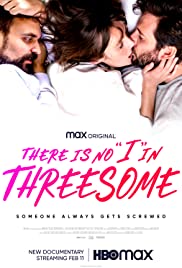
THERE IS NO I IN THREESOME
New Zealand, 2019, 88 minutes, Colour.
Jan Oliver Lucks, Natalie Medlock, Simon London.
Directed by Jan Oliver Lucks.
Most audiences will watch this film as a personalised documentary, a record by the director, Jan Oliver Lucks, of his relationship with Zoe, their engagement, the plan for marrying in a year’s time, but allowing each other to have open relationships while deeply committed to each other. They give each other permission to meet other people, date, experiment, issues of same-sex relationships.
There is quite an amount of frankness during the film, especially with the opening, with the two on a very high diving tower at a swimming pool, their stripping, cameras to their heads, planning to jump together, Ollie jumping, Zoe not. Something a bit symbolic of what is to follow.
Ollie explains a bit about himself and has contact with his mother (Indian-Iranian) in India. He mentions that he likes a certain number of rules because his background is German, his father. We also meet Zoe’s parents as she takes them to the open air location for the wedding, and it is raining.
The film goes on with very frank talking to camera by Ollie and Zoe, about their emotions, about their devotion to each other, their being apart, their dating other people and the effect on each of them as they get to know other partners, Ollie a young woman, Zoe dating Tom, the director of a play she has written. The relationships move to varying stages of intimacy.
There is a frank episode when Ollie spends the night with Tom and he reflects on what this has meant to him.
Perhaps it is obvious that the relationship between Ollie and Zoe is not going to last – even though we might hope so. There are various scenes of tension, discussions, parting of the ways.
Those in the know will not be surprised but the majority of audiences will be surprised, perhaps dismayed, to find that this is not a real documentary, something of a mockumentary, the story and the sequences staged. While Ollie is actually Jan Oliver Lucks, Zoe is, in fact, the New Zealand actress, Natalie Medlock, and Tom is the New Zealand actor, Simon London.
Judging by reviews and bloggers, many people resent having been deceived, having been taken in – but, that was the filmmakers’ intention, to explore the theme, but to be mischievous towards its audience at the same time.
While the film does dramatise a precarious relationship and the risks of its collapse by mutual permissions for open relationships, it is not exactly the most profound of explorations.
Published in Movie Reviews
Published in
Movie Reviews
Saturday, 09 October 2021 13:03
Demon Slayer The Movie: The Mugan Train
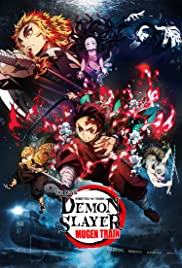
DEMON SLAYER THE MOVIE: THE MUGEN TRAIN
Japan, 2020, 117 minutes, Colour.
Directed by Haruo Sotozaki.
This is a feature film version of a popular television series, Demon Slayer, popular in 26 episodes.
This is a film for the initiated, for the fans of Japanese Anime, for manga films, for Japanese traditions of animation. The older, uninitiated audience, this film may be difficult to watch and appreciate.
However, audiences will be impressed by the quality of the animation style, the drawing, the characters, the vast imagination, action, violence. And, the editing and fast pace propel the action forward – until the end, rather drawn-out, elegiac and mournful about death, but finding a new hero to carry on the tradition of the Demon Slayer.
This is a basic tale of the struggle between good and evil. It presupposes a world of Demons, supernatural creatures, hostile to humans, invading the human world, here the passengers on a train, determined to destroy the humans. It also presupposes a world of human heroes, some specially chosen with destiny, younger fighters, aspiring to be heroes and to join in the quest against the Demons. The film opens with a master Demon Slayer visiting the cemetery, seeing the headstones and naming all those heroes who had died in battle. The film then goes on to introduce three youngsters, one of whom had wears a boar’s head, who hurry on to a train, eager to find the hero slayer.
The hero was on the train, talks to the youngsters, they in admiration of him.
The rest of the film, there is a mysterious presence of the Demon, the human shapes, young male, that he assumes. There are all kinds of combat sequences, the three youngsters and their trying to help, even to being wounded, but the hero going on, long battles and confrontations, the hero being wounded, but defiance against the Demon who is equally determined. And the three youngsters look on with both admiration and dismay.
All the human Demon Slayers live transient lives, and, ultimately, the present hero also dies. However, the youngster who has been in admiration is clearly marked out to be his successor and, while there is a long sequence of mourning for the dead hero, the young man then steps into the hero’s shoes and marches on… To the next Demon slaying adventure.
Published in Movie Reviews
Published in
Movie Reviews
Saturday, 09 October 2021 13:03
Great Barrier Reef
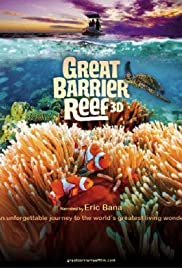
GREAT BARRIER REEF
IMAX, 3-D.
Australia, 2018, 45 minutes, Colour.
Narrated by Eric Bana. With Jemma Craig, Peter Gash.
Directed by Stephen Armezdroz
This is a film that can be seen by all audiences, from primary school audiences to grandparents, even great-grandparents! It is a film that can be recommended.
Over the years, there have been many documentaries about the Reef, including a 2015 film hosted by David Attenborough. However, this film is different. For a start, it is filmed in IMAX format, a huge screen, presenting spectacular underwater photography as Well Is surprising overhead drone photography with huge impact. And, as well, it is filmed in 3-D, enabling a very close encounter with all the living creatures, fish and plant, in the reef which stretches over 1000 km along the Queensland coast.
What makes this film significant, even important, is not that it is, as the director remarks, tabloid in its presentation of issues. The aim is not to sensationalise but to present the life and vitality of the reef in all its wonder. Obviously, it does campaign for activity concerning climate change and illustrates it profoundly. The film takes the camera under the water (and, there are many close-ups of the sophisticated cameras in action with the divers), shows us this world, gives explanations, information about so many of the creatures, the nature of the reef itself, polyps and anemones, the effect of the Crown of Thorns predator destroying the reef (and activists showing how, with an injection of image vinegar, they can be overcome).
There is a voice-over narrative, friendly, by Eric Bana. But communication relies on audiences identifying with Jemma Craig, who grew up on the reef island, Green Island, she and her brother with their parents, learning in the sea from an earliest age. We accompany her underwater, listening to her story, her experiences, her concerns, travelling on a boat that patrols the reef, rescuing a floating (disabled) turtle (after some vivid panoramas of turtles gathering annually at the reef), taking it to Fitzroy Island with the headquarters for the voluntary Turtle Rehabilitation Centre, and her reminding us that we are in the social media age and her showing us her extensive blog.
There is also a visit to Lady Elliot Island, a rehabilitated island, the mining of guano deposits, and, in the 1970s, the establishing of resort centre which is an eco-resort centre, established by pilot Peter gash, who also appears in the film and accompanies Jemma underwater. There are extensive activities for the visitors to the resort, taking them underwater, but also encouraging them to participate in activities which contribute to scientific knowledge (vivid scenes of swimming under Manta Rays, photographing them and computer identification of all these Manta Rays). Sequences of sharks, Minke whales, vast schools of extraordinary fish, vast visions of coral.
(One of the effects of watching this film is probably an increase in bookings to Lady Elliot Island and Fitzroy Island as well is of Jemma Craig’s blog.
A visit to IMAX, if it were possible, would be an excellent outing for school children, especially those in primary school who are discovering such wonders of the world as the Great Barrier Reef, are caught up in the concern about climate change, who can see so many possibilities for careers, imagining themselves working with the creatures, diving under the reef, working in the ever increasing sophisticated laboratories advancing scientific research ever more quickly.
Published in Movie Reviews
Published in
Movie Reviews
Saturday, 09 October 2021 13:03
End of Love, The/ A Couer Battant
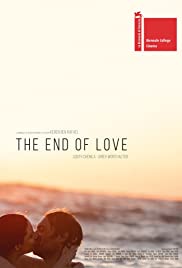
THE END OF LOVE/ A COUER BATTANT
France, Israel, 2019, 90 minutes, Colour.
Judith Chemlka, Arieh Worthalter, Noemie Lvovsky, Vassili Schneider, Gil Weiss, Joy Rieger.
Directed by Keren Ben Rafael.
The End of Love is a brief portrait of a couple who are separated, one living in Paris, the other in Tel Aviv. They communicate by Skype, the whole film focusing on the two computers and their screens, the couple communicating via Skype.
She works with an architectural firm in Paris. He is a war correspondent-photographer who cannot get work or exhibition in France. He is in Tel Aviv but a bureaucratic oversight means that he has to renew his visa before he can return to France.
The film opens with the two, the sexual relationship via Skype. It also reveals that they have a young son, cared for by his mother, but watched with love and protectiveness over Skype by his father. While there is a loving bond between the two, the husband begins to doubt himself, feeling that he is no one in France, that he has possibilities in Israel. The wife feels his absence, his growing concern about himself, feel somewhat alienated. The main part of the film shows the deterioration in the relationship. While the wife’s action is confined generally to their apartment, there is an extended sequence at her mother’s house to celebrate the baby’s birthday, the family in Israel are seen through the Skype camera, genial characters, some conflicts, an old grandfather, Jewish celebration at the meal.
Ultimately, it seems the end of love, the breakdown of the marriage. And continued concern about the son.
The issue is whether the husband should return to Paris, sacrificing himself, or whether the wife should sacrifice herself and join her husband in Israel. Can they live without each other?
1. The title? A portrait of love, challenges to love, failures in love, the end of love? Hope? Reconciliation? New beginnings?
2. The French settings, confined to the apartment, Julie’s mother’s hosting the birthday party?
3. The Israeli settings, confined to the home, family celebrations and meals? The final opening out, the Mediterranean in Tel Aviv? The musical score?
4. The device of communication via Skype, the computers, the angles for filming, scope for images, limitations of images? The impact of close-ups, for the relationship? The clashes?
5. The opening, Julie and Yuval, the sexual relationship, via Skype? The relationship between the two? Yuval, war photographer, living in Paris, limitations of work, possibilities for exhibition, rejections? Going to Israel, with his family, the family bonds, the lapsing of the marriage certificate, needing his visa? The contrast with Julie, at home, going to work, with the baby, Romeo as the babysitter, Charles living in and wearing Yuval’s shirt, the domestic sequences?
6. The importance of Lenny, the young baby, Julie and her care, love, the babysitter? Yuval, watching his son by Skype, his loving devotion, cautions about dangers, worry?
7. The changes over the time, Julie missing Yuval, her going out, her work, the drinking party? Yuval, exasperated, his existential crisis, feeling nothing in Paris, accepted in Israel, not communicating about the visa, the days going without phone calls, the mutual suspicions, Julie and her anger, learning about the visa, wanting Yuval to tell her?
8. The background of the family, the parents genial, talking in English, the in-laws, their own personal tensions and breakup, the old grandfather? The Jewish celebration, Julie watching it?
9. Yuval, the encounters with Romeo, supervising him, the second time, bringing in Lenny?
10. Lenny and the family, the friends, the birthday party? Julie and her clash with her mother, memories of the past, the mother deserted, bringing her daughter up, her drinking, the fights?
11. Lenny and his attempts at walking, Julie and her exasperation, leaving the room, Yuval and his worry, the baby coming back, Julie coming back?
12. The talk of separation, the end of love?
13. The final, Julie swimming, Yuval swimming, the only sequence where they appeared together? And the future? Can they live without each other?
Published in Movie Reviews
Published in
Movie Reviews
Saturday, 09 October 2021 13:03
Ma Vie en L'Air
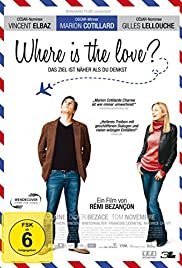
MA VIE EN L’AIR/ WHERE IS THE LOVE?/LOVE IS IN THE AIR
France, 2005, 105 minutes, Colour.
Vincent Elbaz, Marion Cotillard, Gilles Lellouche, Elsa Kikoine, Didier Bezace, Tom Novembre, Philippe Nahon.
Directed by Remi Bezancon.
This is a light romantic comedy, French style, with touches of realism and plot touches of surrealism.
The central character, Yann, Vincent Elbaz, has a fear of flying. And this is odd, because his work is supervising in a flight simulator, many sequences showing the would-be pilots, Yann and his talent in giving advice.
The film has a framework of a flight to Tahiti from Paris, Yann’s fear of flying, the possibility of a crash, his going to the cockpit, the pilot being one of his former students who had failed many of the tests but Yann had allowed him through… This is repeated at the end but Yann shows his ability, the captain and his skills, and a safe landing.
But, this means that the film can go back to Yann and his childhood, his devotion to his father, growing up but not growing up emotionally, caught up in a romance with a young woman, Charlotte, but then losing her for 10 years. There is also his friend, Ludo (Gilles Lellouche in a very early role) and meeting his acquaintance, Alice (Marion Cotillard before her Oscar-winning performance as Edith Piaf).
So, there are Yann’s ups and downs in his emotional life, Ludo telling him that he seems to be unable to say no to anything – while enjoying Alice’s company, not recognising her devotion to him, he meets Charlotte again, finds that she is more dominating than he remembered, wanting a child, and his promising to marry her.
Comic situations, misguided romance, Ludo finally sitting down and working for his funeral director father, Yann flying to Tahiti – and meeting Alice again on the beach.
1. The title? Flying? Flight simulation? Phobias? Overcoming phobias?
2. A romantic comedy, the realism of the plot, the romanticism of the plot, credibility?
3. The framework of the drama, the flight, to Tahiti, Yann on board, his fears, the difficulty of the plane, in the cockpit, the possible crash? This beginning for the flashbacks to Yann’s story? The resumption at the end, the audience knowing more about Yann and his fears, having seen the scenario, the story of the pilot and his tests, Yann and his advice, bringing down the plane safely?
4. Yann, his story, the strong relationship with his father? Growing up, fear of flight, yet his work, the many simulation scenes, his advice, his skills, Ludo and the hostage situation, Castelot and his wanting a license, failing, Yann allowing him the license, and their final success?
5. Yann, his age, not growing up, at 20, social, friendship with Ludo? Ludo’s father, the company business, funerals, the father wanting Yann to intervene, Ludo refusing, moving in, staying for years?
6. Yann, women, the encounter with Charlotte, the lift, the attraction, moving in, the relationship? Yann having to prove himself with flight? Charlotte’s disappearance? For 10 years? His yearning for her? Ludo finding her, joking about her children and weight, telling the truth, Yann meeting her again? The episode of the letter, in the post box, the fire, bombing the fluid, the van passing by? Her responding to the letter? Their meeting, renewing the love, but Charlotte taking over? Wanting a child, wanting to marry? Yann and his inability to say no?
7. Ludo always in the background, the contrast with Yann, their friendship, advice, his lounging around the house, the friendship with Alice?
8. Alice, friendship with Ludo, meeting Yann, her radio program and his listening? The meetings? The background of her marriage and its failure and her betrayal? Their talking, getting to know each other? Yann relying on her? Her wise advice?
9. The attraction between the two, Alice, the meetings, Yann telling her about Charlotte, his telling her about the marriage? The disappointment? Going to Tahiti? Ludo and his advice?
10. Yann, the wedding, his running away, getting the flight?
11. The happy ending on the beach in Tahiti?
Published in Movie Reviews
Published in
Movie Reviews
Saturday, 09 October 2021 13:03
Web of Dreams/ VC Andrews Web of Dreams

WEB OF DREAMS/ VC ANDREWS WEB OF DREAMS
US, 2019, 88 minutes, Colour.
Jennifer Laporte, Max Lloyd- Jones, Cindy Busby, David Lewis, Tim Donadt, Liam Hughes, Lizzie Boys, Keenan Tracy, Iris Quinn.
Directed by Mike Rohl.
The fifth novel in the Heaven series VC Andrews, although this was written by Andrew Neiderman who continued VC Andrews’ novels, retaining her name. It is the fifth in the television series.
Readers of the books were very negative about the film versions, especially critical of the casting choices, their lack of resemblance to the characters in the books, a great deal of attention given to hairstyles and shades of hair… There was also the difficulty of covering all the aspects of the novel in 90 minutes of screen time. Aspects were omitted, plotlines changed.
By the time of this film, the narrative had covered three generations, the story of Leigh, daughter of Jillian, stepdaughter of Tony Tatterton, raped by him and her having to leave the house, going to live in the backwoods of West Virginia; the story of her daughter Heaven, growing up in the backwoods, discovering the background of her family, going back to, her encounter with Tony Tatterton’s brother, Troy; the story of Heaven, her relationship with fellow-student Logan, the clashes with her putative father, with her stepsister, Fanny, love and betrayals. There was also the story of Annie, daughter of Heaven and Logan, the death of her parents in a car accident, her discovering the truth about herself and her origins.
The question was: where to go? And the decision was made, a prequel. The film starts with Annie and her husband Luke seeing the portrait of her grandmother, and the faithful retainer of many years giving her her grandmother’s diary.
Some have felt that this prequel is unnecessary – or that it would have been better as the first film in the series. On the other hand, those who have followed the four previous films will find it often intriguing to see a dramatisation of characters and events with which they are familiar but discovering different aspects.
The young actors who portray the younger Tony and Jillian,, a quite effective in their roles, Tony being a bit more human, but being more disreputable, than he was later in the stolid performance by Jason Priestley. Cindy Busby, on the other hand, is quite effective in embodying Jillian, completely self-centred and absorbed, clashing with her mother, dominating her daughter, in the Kelly Rutherford vein.
This time the focus is on Leigh, Jillian’s daughter (and, as happens frequently in this series, finding that her putative father is not her real father). However, she is devoted to her father, upset at her mother’s selfish behaviour, yet admiring her and her talent for painting, turning 18. She is introduced to Tony, he in a relationship with Jillian, but a roving eye, rescuing Leigh and his little brother, Troy, from a storm in the maze in the garden, getting Leigh to have a bath, then, after his wedding to Jillian, raping her.
Her mother is showing signs of incipient mental problems. She does not believe her daughter. Tony goes on a long trip. Leigh leaves, goes to her grandmother but finds she has died. At the bus station, she encounters a genial young man, Luke, who helps her, takes her to his family, accepts the fact that she is pregnant, the family welcoming her, wedding, but the sudden giving birth out on the plot of land where he intends to build a house for them, her dying in childbirth.
And, there is the background for all the melodramatic events that will follow, the tormented characters, the strange sexual relationships and paternities, family conflicts…
Published in Movie Reviews
Published in
Movie Reviews
Saturday, 09 October 2021 13:03
Amants de Pont Neuf, Les
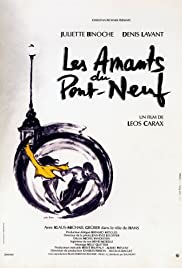
LES AMANTS DE PONT NEUF
France, 1991, 125 minutes, Colour.
Juliette Binoche, Dennis Lavant, Klaus- Michael Gruber.
Directed by Leos Carax.
Leos Carax is, to say the least, an idiosyncratic director, making an impact in the 1980s, then getting attention from this film. Later films include Holy Motors and Pola X.
At the time of filming, the Pont Neuf bridge was under repairs and the screenplay takes advantage of the characters taking refuge on the site. So, on the one hand, there is a grim side of the film, homeless people on the streets and on the bridge, in institutions, in jail, on the other hand there is some spectacular photography of the city of Paris including a fireworks show.
The film introduces its two characters, Alex played by Dennis Lavant who appeared in several of the director’s films, as a circus acrobat, addicted to alcohol and drugs, almost run over by a speeding car on a deserted street, taken into care, hospital, then returning to his favourite spot on the bridge, protected by a former security guard, arms, Klaus- Michael Gruber. Observing the car going past and Alex on the Road, is Michelle, an artist, yet suffering and incapacitating illness, affecting her eyes. She is also on the streets, memories of a failed love affair, wanting to avoid her family who are interested in her getting treatment.
The film is a character study of an odd couple, their interactions, the clashes, getting to know each other, friendship, helping each other.
Alex in fact spends some years in jail after trying to destroy posters asking Michelle to make herself known to family so that she can receive treatment. Eventually, she visits him in jail. When he gets out, they meet up, renew their friendship and, in an extravagant moment, fall into the Seine, are rescued by a barge which is sailing to La Havre – and their future?
1. The title? Paris? The bridge (under repairs 1989-1991)? The lovers, an odd couple?
2. The work of the director, romanticism, bizarre aspects of life and characters, visually spectacular sequences? The musical score, classics and contemporary?
3. The introduction, Alex, drunken state, wandering the road, Michel, with her paintings, the fast car, Alex’s injuries to his leg?
4. The story of Alex, the circus, his age, height, small, gymnastic? Drinking and drugs? Living on the street? His fixed spot? The protection of Hans, their friendship, discussions? The collection of the street people, going to the institution, signing documents, refuge? Alex and his injuries, in the hospital, the cast on his leg, his stick? Seeing him wandering the streets, going to a special spot? Encountering Michelle, his reactions, wanting to oust her, the advice of Hans, his protection?
5. The story of Michelle, her background, family, talent with painting, her illness, her eyes, the deterioration, limitations of site, mental situation, on the street, wandering with her paintings, her paints, the scenes of her painting, relying on her memory, the painting of Alex as he lay on the street, her memory? Her spots, Hans and wanting to move her on? Her eventually talking with him, his listening and help?
6. The development of the friendship between Alex and Michelle, their spots, talking, her leaving, his going to find her? Stealing the fish at the market, their meal, sushi? The gradual confiding in each other?
7. The effect of each on the other, friendship, support, consolation, moments of love?
8. Michelle and her disappearance, the posters searching for her, Alex destroying them, burning them?
9. Michelle, the story of her love for Julien, going to meet him, leaving him?
10. Alex, his behaviour, violence, imprisonment, three years, the change in him?
11. Michelle, her sight restored, coming to visit him, the effect of the absence between them?
12. Alex out of jail, reunited with Michelle, on the bridge, the struggle, falling into the water, underwater, each surfacing, the passing barge, the last trip, the sand, going to Le Havre, there deciding that that was where they wanted to go?
13. The background of the city of Paris, the sites, the life, the people, spectacular aspects, the fireworks, the music, Alex and his gymnastics, Michelle’s paintings?
Published in Movie Reviews
Published in
Movie Reviews
Saturday, 09 October 2021 13:03
Goodbye, Mother
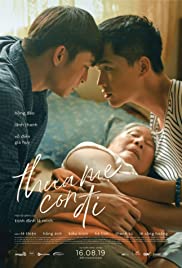
GOODBYE MOTHER
Vietnam, 2019, 106 minutes, Colour.
Hong Dao, Lanh Thanh, Vo Dien Gra Huy, Nsut Le Thien.
Directed by Trink Dink Le Minh.
During the first decades of the 21st-century, there has been some growth in Vietnamese cinema – and some of the films taking up the issues of sexual orientation, Vietnamese tradition, wariness of homosexuality.
This is the theme of Goodbye, Mother, but it is treated very gently, a way of storytelling that will draw in Vietnamese audiences and help them to understand something of homosexual orientation.
The plotline is fairly straightforward, a young man, Van, has spent years studying in the United States and returns home for his grandfather’s transfer of burying place. He is accompanied by his partner, Ian. The family, and the extended family with all its complications and tensions is shown, do not quite understand. And, especially at family gatherings, Van is pressurised to declare his intentions about marriage.
There is a comic complication with Van’s grandmother. She has dementia but remembers some things and is innately shrewd. She mistakes Ian for her grandson and wants him continually with her, confiding in him, but also noticing the kiss with Van. Eventually, he confides in her and she is supportive.
Much of the drama is with Van and his mother, a widow, managing the family business, clashes with her sister, the young flirtatious niece, an unmarried niece, the young friend of Van from school days but now drinking and with thugs – who eventually indulge in some homophobic bashing.
The challenge is to Van to explain to his mother – and an unexpected sequence where Van thinks he is talking to Ian through the bathroom door but his mother emerges.
There is some resolution, his mother unwell, but Van promising to organise her coming to the United States, as he and Ian returned to America.
It would be interesting to know more about how this film was received in Vietnam.
1. The Vietnamese story, in Vietnam, in the United States? Universal themes? Family? Sexual orientation? Coming out?
2. The Vietnamese setting, the countryside, the town, the fields, home, trading, celebrations, the field and the tombs? Middle-class family? Musical score?
3. The story of Van and Ian? The background in the United States, meeting there, living together, than having to return for his grandfather’s grave transferral, to tell his mother about himself, Ian agreeing to accompany him? The immediate attention at the airport? Joy at Van’s return? Puzzle about the presence of Ian? Travelling home, the extended family and the different responses? Settling into the room? The hard bed of the floor? The meals, the gatherings?
4. The portrait of Van, his Vietnamese origins, memories of school days, with Khoi, leaving, achievement in the United States? Hope for the future, uncertainties? And the portrait of Ian? Genial young man, personable, supportive? (And cousin Kim wanting to be near him, flirting?)
5. Grandma, age, the dementia, her tough manner, at the table, with the rest of the family? Her mistaking Ian for Van? Her wanting him present, in the room, on the bed, talking to him as if he were her grandson, even about the inheritance? Her liking for him? Her noticing the kiss, questions about it?
6. Van and his mother, her being supportive, the moving of the grave and the ceremony? Running the business? The drive and Ian and Van with the deliveries? The sister, her accusations about money, the inheritance, her bad history of gambling? The sales of the fake medicines? Van and his mother burying them? The strong stances, Van offering money, his discovering her illness? At the celebrations, urging him to talk about his future? The eventual revelation, Van thinking he was talking to Ian in the bathroom, his mother emerging? Her puzzle? Her final acceptance? Van inviting her to come to America, promising to arrange the documents? Her work in the business – and her finally being seen learning to drive?
7. The daily dealings of the family, aunts and uncles, in-laws, the various jobs, with the work, the family difficulties, married and unmarried? Studies and exams? The deals at the stores, Khoi, past friendship with Van, drinking, spending the money, his drunken friends, homophobic, bashing Ian?
8. The intimacy between Ian and Van, in the room, the shower, the relationship? Ian and his being hurt, Van going off with Khoi and the friends, arriving home late, the tension between them, Ian and his stances? Yet his continued support?
9. The farewell to grandma, her still delighting in Ian as her grandson?
10. The drive to the airport, the wistful memories at the airport? The future?
Published in Movie Reviews
Published in
Movie Reviews
Saturday, 09 October 2021 13:03
Sisters, 2006
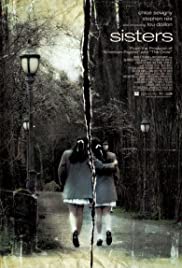
SISTERS
US, 2006, 92 minutes, Colour.
Chloe Sevigny, Stephen Rea, Lou Doillon, Dallas Roberts, JR Bourne, William B.Davis, Gabrielle Rose.
Directed by Douglas Buck.
Sisters is a remake of the 1972 thriller by Brian de Palma. Sisters is considered as something of a minor classic, along with other films by De Palma, emulating Alfred Hitchcock (Obsession, Dressed to Kill, Blow Out). Many commentators have wondered why there was any need for a remake 30+ years later.
The screenplay follows the original, though updating some of the technology used for surveillance. And, there are some variations on the action, and a contemporary variation on the ending.
The film takes place over two days, an introduction to a sinister doctor who experiments with drugs and treatment, played by Stephen Rea. Then there is his assistant, Angelique, the credit introducing Lou Doillon (Jane Birkin’s daughter) although she had appeared in many French films.
At a gathering with the children where the doctor is acting as a magician, there is an American visiting doctor who is approached by Angelique. There is also a reporter, Grace, played by Chloe Sevigny.
The reporter watches outside Angelique’s apartment all night, then goes to examine the doctor’s office across the street, witnesses the murder of the doctor who had accompanied Angelique. She contacts the police – they find no evidence of the murder, the doctor and Angelique having cleared everything (but with the body hidden behind the television set).
Grace continues her investigation, her associate is taken by the doctor, Grace herself taken and subjected to medical procedures – with a revelation about Angelique, her mother, Siamese twins, the stabbing of the doctor, Grace becoming the deceased Siamese twin, the two sisters, in girlish uniforms, walking away.
The film has its moments – but does strain plausibility.
1. The remake of Brian de Palma’s film? Update, reworking of plot, ending? Praise and critique of the adaptation?
2. The city settings, the streets, apartments, interiors? The Institute, the grounds, the countryside? The musical score?
3. The title, the background of Siamese twins, the 19th century stories, Barnum’s Circus, other twins performing, together, separated, surgery? As background to this story?
4. The introduction to the doctor, his magic tricks, his Institute, those of the Institute, deformities, illness? Angelique as his assistant? Dr Wallace and his watching? Grace and her disguise, observing? Atmosphere?
5. Angelique, presence, and look, style? With the children? Her approaching Dr Wallace? His giving her the lift? The doctor and his disapproval? Grace and her observing?
6. Dr Wallace, in the apartment, the seduction, the sexual encounter? The next morning, the episode with buying the cake, his being demanding, the two sisters? His return, the vicious attack, the murder, coming to the window, his collapse?
7. Grace, sitting in the car during the night, observing, going up to the doctor’s office, searching the documents, finding the syringes, the Tristiana name? Looking at the murder through the window? Her reaction, calling the police, waiting in the lobby, their suspicions, her story, claiming she saw it from ground level? Going up, finding the clean apartment, discussions with Angelique, her plausible story? The audience seeing the blood behind the television set and the connection removed? The melted ice cream and cake, the detective eating the cake?
8. The vicious murder, the two sisters, the arrival of the doctor, the quick cleaning of everything, concealing the body?
9. Grace and her work with Larry Franklin, sharing investigations, his breaking into the apartment, the body in the television set, the phone ringing? His being taken by the doctor?
10. Grace, being taken by the doctor, the laboratory, with Angelique?
11. The hallucinatory nature of the ending, real/unreal? The two sisters, Grace looking like Annabelle, the dark hair, the similarities? The issue of the twins and their being separated, the wounds? The attack on the doctor, killing him? The two sisters, bonding? The identical dress, walking off together, into the future?
Published in Movie Reviews
Published in
Movie Reviews
Saturday, 09 October 2021 13:03
Song Lang
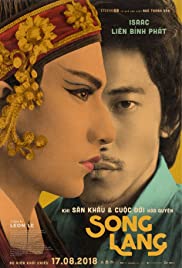
SONG LANG
Vietnam, 2018, 98 minutes, Colour.
Lien Binh Phat, Isaac, Phuong Minh.
Directed by Leon Le.
Song Lane is a traditional Vietnamese musical instrument. The narrator of this story, Dung, suggests it can also be a traditional symbol of something which anchors one’s life and purpose.
The setting is Vietnam in the 1990s, in the poorer parts of the city, but also in the theatre. There is a performance of a Vietnamese Opera, long excerpts on stage, beautifully costumed, melodramatic in style.
Dung grew up in a theatre atmosphere, a happy boy, admiring his father and his musical ability, watching performances with delight, but the tragedy of his mother departing. It is surprising to find that he has grown up as a loner, looking tough with his moustache, a debt collector, not afraid to be brutal, working for a shrewd businesswoman, Auntie Nga. There are several episodes of his rough tactics, unforgiving because it is his job, but some lyrical moments with two little girls at home while he awaits the return of their parents – which leads to a brawl, and the news that the mother had committed suicide and poisoned her little girls. In fact, the distraught husband, will eventually be his nemesis.
One of his jobs is to demand repayment from a theatrical company, pouring petrol on their costumes but saved by the arrival of the central actor. Later, Dung goes to a performance and is enthralled.
The melodrama of the film is that Dung is in a restaurant when a group accost the actor and start a fight, Dung intervening and rescuing the actor, taking him home, the beginning of a tentative relationship, their gradual confiding in each other, the actor finding some books and songs from the past, Dung wanting him to sing, getting out his musical instruments and accompanying him.
There is a sombre ending to the film, the distraught father attacking Dung, Dung bringing a gift of his lost keychain to the actor, the actor urging Dung to come with his instruments to audition for the theatre company.
A sad film.
1. Title? The musical instrument? The initial explanations? The symbol of an anchor in life, purpose?
2. The Vietnam setting, the 1990s, the city, the streets, the businesses, people in debt, loan shark, debt collection? The contrast with the music and the opera, the singing, costumes and decor? The background musical score?
3. The structure of the film, the focus on Dung, his life and work, the insertions of the flashbacks, the young boy, his family, music and performance, family difficulties?
4. The portrait of Dung, his age, living alone, the debt collection, violence and threats, treatment of people, his job and seemingly impervious to violence? His visits to Auntie Nga, her supervision? Her philosophy of lending, seeing her with the young woman, strict and demanding? Dung and his loyalty?
5. The various episodes, the debtors, pleading for extensions? His visiting the debtor, away at the hospital with his wife, the two little girls, Dung staying with them, peeling the fruit, sharing the play? The parents arriving home, the confrontation, the little girls and their fear? The later news of the mother poisoning the girls, her suicide, the visit to the hospital, the desperation of the Father? Confronting Dung? And the nemesis with the killing in the theatre?
6. The theatre company, their debts, Dung threatening to burn the costumes, pouring the petrol? The desperate mother, the arrival of Linh Phung, moments of repayment after the performance? The young man, the rehearsals, the old master, urging more heart rather than just technical excellence? The reprisal of this at the end, his experience with Dung, grief at the death? Manifest on stage, the audience response, tears and applause?
7. Dung, going to the theatre, his memories, his father, the musical tradition and the instrument, playing it? His happiness watching performance? The departure of his mother, the grief? His idealising his father? His father and the instrument, playing? His father’s photo in the gallery of photos? His decision to go to the performance, watching, seeming impassive, absorbed, applauding?
8. The actor, in the bar, having the drink, the drunken group taunting him, the fight, his being bashed, Dung stepping in, demolishing the group? Taking the actor home? His coming
to consciousness, missing the performance? The troupe and their having to get another actor to go on, the fuss?
9. The actor, his experience with Dung, the memories of the petrol and the threats? His injuries? Dung helping him, but the actor taking his clothes and leaving? Losing his key? Returning? The tension, the discussions, Dung and his response? Going out, the meal, the sharing of memories, the actor opening up, Dung gradually revealing himself? Sleeping, waking, the actor finding the books, the song, Dung wanting him to sing, opening up the instruments and playing? The actor suggesting he come to audition? Dung’s reluctance?
10. Dung, the collection, the old man of the funeral, Dung and his selling all his instruments and souvenirs, giving the money to the old man?
11. The performance, Dung finding the keychain, wrapping it for the actor, going to the theatre, his being stabbed, the focus on the blood in the tiles and cracks, the rain coming down and washing it away?
12. The actor, the performance, heartfelt, his tears? The audience response? His walking on the pavement, the rain and the blood?
13. The operatic tone of the film, the long excerpts from the Vietnam Opera, the traditions, the beginnings of love between Dung and the actor, tragedy?
Published in Movie Reviews
Published in
Movie Reviews